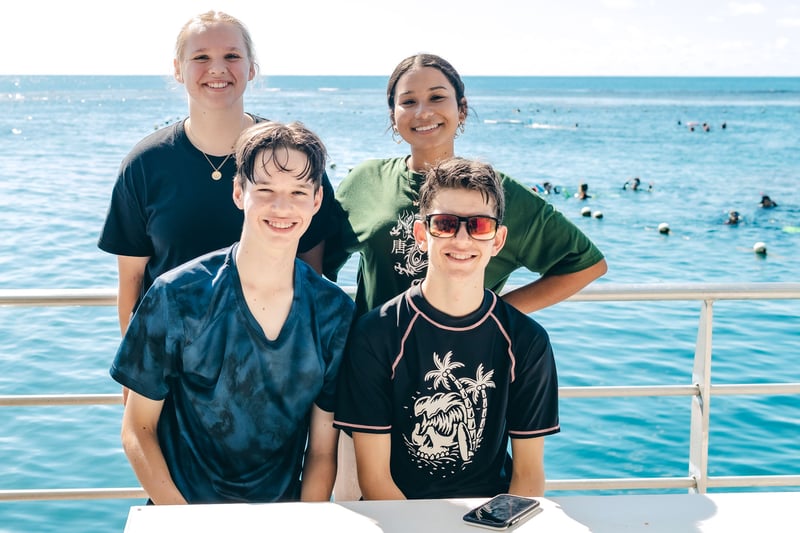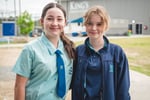
Hurray! It's the school holidays! Time to play, rest and reconnect with friends and family. An opportunity to recharge and rejuvenate. The chance to dream, explore and catch up on all those hobbies that demand more time.
After a term of school work and routine, students deserve a break ... as do their parents! But how do we prevent their academic skills from slipping and ensure they don't forget what they've learnt - particularly during the long summer holidays (which equate to two whole months for Australian private schools)? Multiple research studies show that children from all backgrounds drop back two months in maths and one in literacy when they return to school after the long vacation. Those aged eight to 13 are the worse affected - particularly with repetition-based learning such as times tables and spelling. But surely we don't expect our kids to be doing maths and spelling drills during the holidays?
School policy on homework varies widely. Many schools set holiday projects and assignments for their students. Others set 'optional' homework (which can be ignored or completed religiously, depending on the temperaments of child and parent) and there is a growing trend for schools to ban holiday homework altogether: "Let them play! Let them enjoy their childhood".
You'll probably be pleased to note (or at least your child will) that King's policy sits somewhere between the last two categories. However, if your child is falling behind in a specific area, they should dedicate a small amount of holiday time to addressing this, eg doing some online maths exercises on fractions on IXL. If your child is in Year 11 or 12, they should take responsibility for their learning and do some assignment work or study during the school break.
Whatever you do, make sure they READ
The one thing all educationalists agree on, is that you should encourage your child to read throughout the holidays. And, if they are young enough to still appreciate it, read to them as well (see our blog, When Should I Stop Reading to My Child?).
This is the time to read for pleasure and discovery; let them read those Enid Blyton books and comics if they want to. Let them pore over factual books about crystals or Hollywood screen legends, if that is their interest. Take them to the library and let them choose their own books. Read information signs in museums or on bush walks. Younger children can be encouraged to read shopping lists, menus in cafés or home-made treasure hunt clues.
High School students should be reading a novel during the holidays. Often this is set by school, but at least they can read it in comfort of their own bed ... or swinging in a hammock.
The worst thing you can do is let your child sleep in and stare at screens every day
Operative words: 'every day'; I would hate to deprive any child of the luxury of a late rise or the pleasure of a bit of computer gaming but it's important that this doesn't become a daily routine.
Your child needs to keep mentally and physically active during the holiday.
- Ensure that they get outside and have at least 60 minutes' physical exercise every day. This could include going for a walk, throwing a frisbee around, riding a bike or scooter, helping with the gardening, playing on the beach - it doesn't have to be tennis camp!
- Read every day.
- Spend family time together - do some shared activities, talk, hang out, reconnect.
- Establish some screen free days each week. (That may need to apply to you too!)
- Set some 'quiet time' each day, without distractions, where kids are encouraged to read, dream, rest ... or even get bored (this is when ideas and inspiration often take hold).
- Consider making a 'holiday plan' with the whole family: Gather "What's on" listings (eg cinema times, library events, Gold Coast City Council's Active & Healthy program) and schedule some family activities. Post them up on a calendar/timetable so that your children can anticipate and look forward to upcoming events. This is particularly good for younger children who are still getting their heads around the concept of time.
- Ease back into a regular sleep, study and meal routine a week or two before the end of the long holidays, in preparation for the return to school.
The holidays are a fantastic time for your child to put into practice things they have learnt at school, to catch up with extra-curricular interests and to explore and discover something new.

Ideas for keeping 'holiday brain' at bay
- Do some fun online maths, reading or spelling games to keep skills sharp or catch up in problem areas.
- Play some card or board games - chess, Scrabble, Boggle, Scattergories etc. These can help with maths, literacy and problem solving skills. Younger children could play Snakes & Ladders using two dice and practice adding the two numbers together when taking their turn. Charades and Pictionary can help develop communication skills and analytical thinking.
- Do something cultural - visit a museum or art gallery, see some theatre or watch a dance performance. Broaden their knowledge and cultural awareness.
- Practice a skill or learn a new one - computer coding, paddle-boarding, clothes design, photography, ukulele ... or how to moonwalk! Learn along with your kids and share the experience.
- Write for fun (yes, it is possible, even for six-year-old boys who hate English, I have discovered): Keep a journal, write song lyrics, letters, emails, blogs, lists, a comedy sketch, a menu for tonight's dinner. (See our blog, For the Joy of Writing, for more ideas)
- Get outside - go for a hike, bush walk, mountain climb, beach run. Talk about what you see, take photos, read information posts.
- Encourage your kids to discuss everything with peers and family - TV, books, films, theme parks, music, days out. This will help them develop their critical and analytical skills.
- Do something you've never done before with your kids - book a karaoke room for a family sing-along, organise a neighbourhood cricket match, 'camp in' for the night in the living room with sleeping bags and a midnight feast. Break with the ordinary and create some new family memories.
- Put school knowledge into practice in practical situations - do some cooking (read recipes, calculate volume and weight), make a moving toy vehicle (physics, engineering, maths), plan a road trip (geography), nurture a garden (botany), design a book cover (art).
- Do a family project - shoot a funny family film, redecorate a room together, research and document family history, build a bonfire, plan an event.
- Encourage your children's curiosity: Whenever they show interest in something - be it a museum exhibit, a historic fact from a film, an aquatic creature they see at Sea World - get them googling, asking questions, researching. This will develop a thirst for knowledge and investigative skills that will benefit them right through school, university and their working life.
- Do some voluntary work - fundraising, community service, visiting or serving the elderly, missions, care of the environment.
- Get them to do some chores. Not just to make them pull their weight around the house, but to develop independence and genuine life skills. My nine-year-old is learning how to iron and cook family meals (not simultaneously, I might add!). He's not quite past T-shirts and pasta yet but is confident and adept with his new skill set. I get my six-year-old to audit the contents of the fridge and write what we need on a shopping list.
But do have fun. Holidays are intended to be an enjoyable break, not an over-scheduled to-do-list. Your kids will love the opportunity to just hang out with you and slob out in front of a movie. Their developing brains need this happy, lazy downtime as well.
Happy holidays! See you next term.
Do you think children should have holiday homework? Share your thoughts and ideas.











